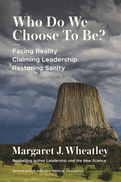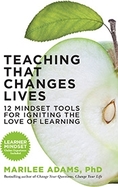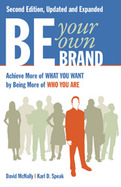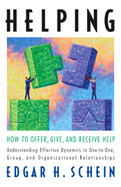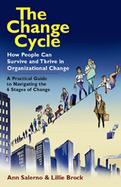Bestselling author Margaret Wheatley has summoned us to be courageous leaders who strengthen community and rely on fully engaged people since her 1992 classic book, Leadership and the New Science, and eight subsequent books. In response to how quickly society is changing and the exponential increase in leadership challenges, this second edition of her latest bestseller is 80% new material.
How do we see clearly so that we can act wisely? Wheatley brings present reality into clear and troubling focus using multiple lenses of Western and Indigenous sciences, and the historic patterns of collapse in complex civilizations. With gentle but insistent guidance to face reality, she offers us the path and practices to be sane leaders who know how to evoke people's inherent generosity, creativity, and kindness.
Skillfully weaving science, history, exemplars, poetry, and quotes with stories and practices, Wheatley asks us to be Warriors for the Human Spirit, leaders and citizens who stay engaged, choose service over self, stand steadfast in the midst of crises, and offer our reliable presence of compassion and insight no matter what.
Teaching That Changes Lives is a transformational and practical guide that will enable teachers to make an authentic difference with their students and avoid succumbing to the myriad pressures and challenges of their jobs.
Using the storytelling format that proved so successful in her previous book, Adams tells how Emma, a sixth-grade teacher on the verge of quitting her job, learns to cultivate what Adams calls the “Learner Mindset”— having the discipline, curiosity, and courage to consistently ask growth-oriented, open-minded questions of oneself and others—and to avoid the close-minded and critical “Judger Mindset.” Emma transforms her classroom, her relationships with her colleagues, and, most importantly, her students' eagerness for learning and achievement.
Teaching is more than imparting facts and skills—it's preparing students for the test of life. Featuring an innovative, easy-to-follow workbook and access to a Learner Mindset online mini-course, this inspiring book will ensure that teachers and students alike become creative, resilient problem solvers, bridge builders, and lifelong learners.
This visionary but practical handbook offers mission-driven business owners a roadmap for ensuring their company's lasting impact, building leadership internally, and fostering participatory management.
Through inspiring real-world stories of B-Corps, worker co-ops, ESOPs, and employee ownership trusts, this book demonstrates how to create resilient organizations that benefit workers and communities.
Drawing on his 50-year journey with South Mountain Company and extensive research, Abrams outlines five critical transitions for mission-driven businesses to become what he calls a CommonWealth company:
• From founder to next-generation leadership
• From sole ownership to widely shared
• From hierarchical control to democratic management
• From unprotected mission to preserved purpose
• From business-as-usual to B Corp force for good
From Founder to Future is an essential guide for mission-driven leaders seeking to reshape their businesses for inclusivity, longevity, and positive impact. Whether you're a retiring owner planning your exit, a young entrepreneur building for the future, or an employee working in a purpose-driven business, this book offers a blueprint for creating enduring, values-driven enterprises in the emerging regenerative economy.
As 3,000,000 U.S. small business founders over 55 prepare to retire, $10 trillion in assets will change hands over the next two decades. This timely guide shows how to preserve your company's mission and legacy while empowering the next generation.
2010
-
New edition of the book that introduced the concept of personal brand as a powerful personal and professional development tool
-
Thoroughly revised and updated, with a new material on how to use social media to build a powerful personal brand and case studies of individuals whose personal brands have changed the world
-
Filled with unique and tested tools and exercises to help you develop a distinctive personal brand
You may not know it, but you have a brand. Over time, the people who interact with you -- colleagues, acquaintance, family and friends -- develop a set of perceptions of who you are what you stand for. But does your current personal brand truly reflect who you are and the difference you make? You're probably not even aware of what your brand is now, but you can consciously create one that accurately reflects your truest personal values.
Developing a personal brand is not about constructing a contrived image. Rather, it is a process of discovering who you really are and what you aspire to be, and learning how to leave the impressions that reflect your true brand. The hallmark insight of the new edition is that the best way to establish a strong and memorable brand is to make a positive difference in the lives of others. "When you make a discernable difference in the life of another," they write, "you make a lasting impression and your brand receives credit."
Be Your Own Brand shows how to create a personal brand that is distinctive, relevant to others and consistent in the way it is perceived and presented. McNally and Speak take you through the process of identifying the components of your brand, conveying that brand to the world, checking how closely your brand aligns with those of significant others -- particularly your employer -- and assessing your progress along the way. The plethora of tested tools and exercises they provide make the experience easy, enlightening, and enjoyable.
2009
By the bestselling author of Career Anchors (over 431,000 copies sold) and Organizational Culture and Leadership (over 153,000 sold)
A penetrating analysis of the psychological and social dynamics of helping relationships
Named one of the best leadership books of 2009 by strategy+business magazine
Helping is a fundamental human activity, but it can also be a frustrating one. All too often, to our bewilderment, our sincere offers of help are resented, resisted, or refusedand we often react the same way when people try to help us. Why is it so difficult to provide or accept help? How can we make the whole process easier?
Many different words are used for helping: assisting, aiding, advising, caregiving, coaching, consulting, counseling, guiding, mentoring, supporting, teaching, and many more. In this seminal book on the topic, corporate culture and organizational development guru Ed Schein analyzes the social and psychological dynamics common to all types of helping relationships, explains why help is often not helpful, and shows what any would-be helpers must do to ensure that their assistance is both welcomed and genuinely useful.
The moment of asking for and offering help is a delicate and complex one, fraught with inequities and ambiguities. Schein helps us navigate that moment so we avoid potential pitfalls, mitigate power imbalances, and establish a solid foundation of trust. He identifies three roles a helper can play, explaining which one is nearly always the best starting point if we are to provide truly effective help. So that readers can determine exactly what kind of help is needed, he describes an inquiry process that puts the helper and the client on an equal footing, encouraging the client to open up and engage and giving the helper much better information to work with. And he shows how these techniques can be applied to teamwork and to organizational leadership.
Illustrated with examples from many types of relationshipshusbands and wives, doctors and patients, consultants and clientsHelping is a concise, definitive analysis of what it takes to establish successful, mutually satisfying helping relationships.
2008


